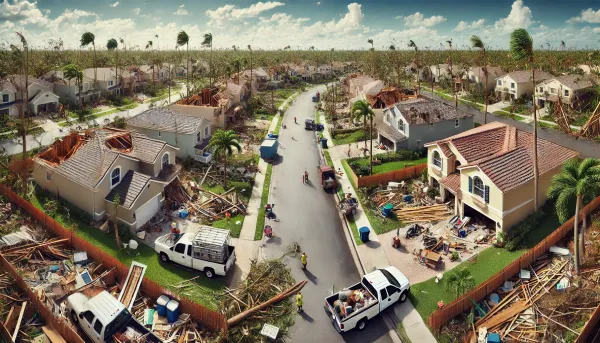
The Florida Home Insurance Crisis: What Every Homeowner Must Know Before It's Too Late
Florida homeowners are facing a perfect storm—not just from hurricanes but from a crumbling insurance system that’s leaving many unprotected when they need it most. Whether you're a long-time resident or a new buyer, understanding Florida's insurance landscape is critical. Here's what you need to know about the current crisis, why it’s happening, and how you can protect yourself.
A Broken Promise: When Insurance Fails Homeowners
After hurricanes Helene and Milton swept through Florida, thousands of homeowners filed claims for damages. Unfortunately, many of these legitimate claims were denied or underpaid. According to insurance adjuster Sean Cling, companies are exploiting legal loopholes to shift blame to "flood damage," a category with stricter coverage limits.
Key takeaway? Flood damage policies cap payouts, often leaving homeowners to pay for extensive repairs out of pocket. Even if your home is destroyed, you’re still on the hook for your mortgage while you wait years for claims to resolve.
For more on flood insurance limits, visit FloodSmart.gov.
Why Florida Insurance is a Minefield
Florida was once a model state for homeowner protections, offering legal safeguards like fee-shifting provisions to ensure insurers paid fair settlements. However, recent legislative changes have tipped the scales in favor of insurers:
2023 Legal Reforms: These laws make it harder for homeowners to sue insurers, even in cases of clear wrongdoing.
Disappearing Coverage: Many policies now lack essential protections like wind damage coverage or fair payouts for total losses.
Insurance Company Tactics: Companies often hire engineers to argue damages were pre-existing or unrelated to storms, reducing payouts.
Looking for detailed insurance law insights? Check out Florida's Office of Insurance Regulation.
How Hurricanes Highlight Insurance Failures
Sean Cling’s firsthand experience during Florida’s recent hurricanes reveals the shocking reality:
Reclassification of Damages: Insurers often mislabel storm-related issues as flood damage, avoiding higher payouts under homeowner policies.
Underpayment Trends: Some policies cap water damage at $10,000, but with deductibles and exclusions, homeowners receive far less than what’s needed for repairs.
Prolonged Legal Battles: Cases from Hurricane Ian in 2022 are still unresolved, with court dates set as far out as 2025.
For more on hurricane preparation and insurance tips, visit the National Hurricane Center.
Florida's Real Estate Market: A Shift Toward the Wealthy
Insurance woes are reshaping Florida’s housing market. As premiums rise and claims denials mount, only wealthier buyers can afford the risks:
Investor Takeover: Damaged homes are being sold to investors for pennies on the dollar. These properties are later resold or redeveloped, often displacing middle-class homeowners.
The Self-Insurance Trend: Homeowners with the means are opting to self-insure, bypassing costly and unreliable policies entirely.
This shift raises the question: Is Florida becoming a state for the rich? If you're considering buying or selling, review your insurance options carefully with a trusted advisor.
Tips to Protect Yourself in Florida's Insurance Landscape
If you’re navigating Florida’s insurance challenges, these steps can help:
Understand Your Policy
Many homeowners don’t realize their coverage is insufficient until disaster strikes. Review your policy annually, and ask questions about coverage gaps, especially for wind, flood, and water damage.Avoid the Cheapest Policies
Cheap policies may come with reduced coverage. Instead, opt for established companies like Chubb, State Farm, or USAA, which have better reputations for paying claims.Document Everything
Keep a detailed record of communication with your insurer. Sean emphasizes, “If it’s not in writing, it didn’t happen.”Work with a Public Adjuster
Local public adjusters are licensed experts who advocate for homeowners. They can ensure claims are properly filed and assessed. For reputable Florida adjusters, visit the National Association of Public Insurance Adjusters.Prepare for Major Claims
Save insurance for catastrophic events. Filing smaller claims can increase premiums or lead to dropped coverage.
Can You Still Sue Insurance Companies in Florida?
The short answer is yes, but new laws make it harder. Lawsuits are now only feasible for large claims where the potential payout justifies the cost of legal representation.
Homeowners can also pursue bad faith lawsuits if insurers act unethically, but recent legal reforms have made these cases rarer. If you feel your rights are being violated, consult a property insurance attorney specializing in Florida law.
For legal assistance, visit Florida Bar's Consumer Protection Division.
What Does the Future Hold?
Unfortunately, Florida’s insurance reforms have yet to stabilize the market. While more companies are entering the state, many are unreliable startups run by individuals behind recently bankrupted insurers.
Sean warns: “These companies are great at collecting premiums but terrible at paying claims. Many of them will go insolvent after the next major storm.”
For updates on Florida's insurance market, follow Florida Disaster Insurance Resources.
The Bottom Line
Florida’s home insurance system is at a breaking point. Whether you’re buying a new home or renewing your policy, it’s essential to stay informed, review your options, and advocate for yourself.
If you need expert guidance, connect with local professionals who understand Florida’s unique challenges. And if you’re selling your home, ensure buyers understand the risks and responsibilities of insuring property in the Sunshine State.
Stay Prepared, Stay Protected
For more advice on navigating Florida’s housing market and protecting your biggest investment, check out our other blog posts.
Have questions about real estate or insurance? Contact us today at Sancastlerealty.com to learn how we can help you make smarter decisions in Florida’s evolving market.
